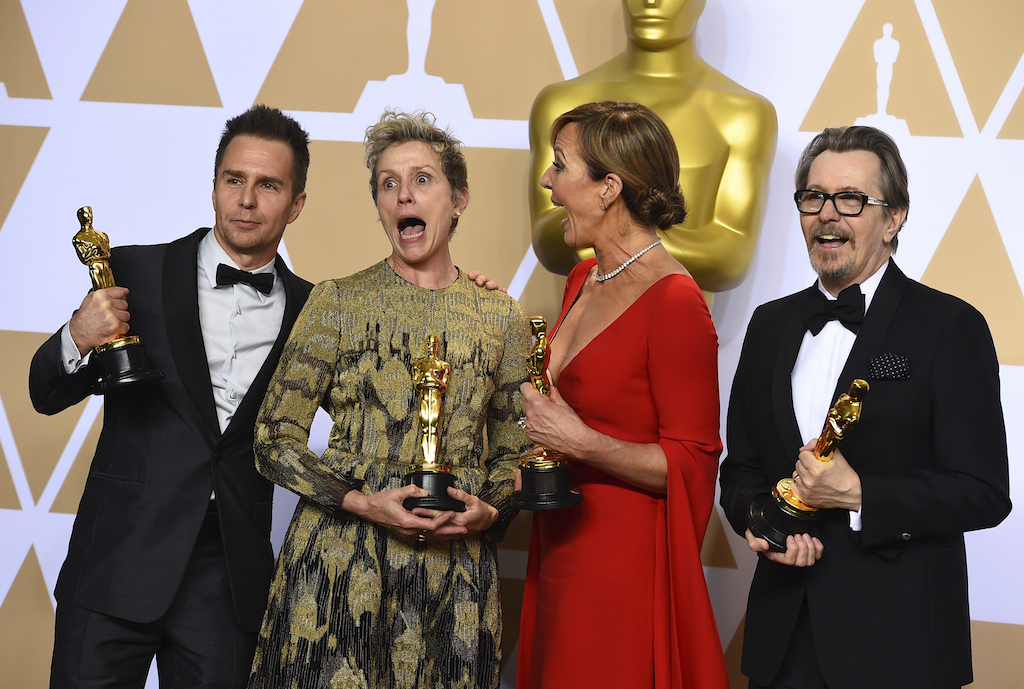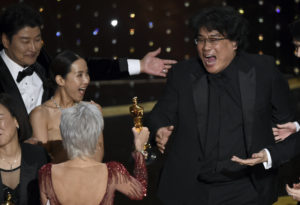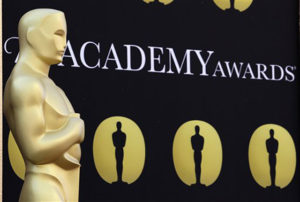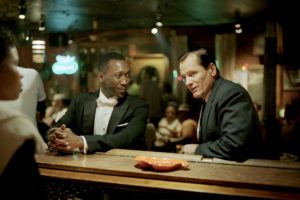Inside and Outside the 90th Academy Awards
Carrie Rickey watched the show on TV. Jordan Riefe watched backstage at the Dolby Theatre in Los Angeles. Together, they provided running commentary. From left, Sam Rockwell (best supporting actor, "Three Billboards Outside Ebbing, Missouri"), Frances McDormand (best actress, "Three Billboards Outside Ebbing, Missouri"), Allison Janney (best supporting actress, "I, Tonya"), and Gary Oldman (best actor, "Darkest Hour") celebrate their Oscar wins in the press room at the Dolby Theatre in Los Angeles. (Screen shot via Jordan Strauss / Invision / AP)
From left, Sam Rockwell (best supporting actor, "Three Billboards Outside Ebbing, Missouri"), Frances McDormand (best actress, "Three Billboards Outside Ebbing, Missouri"), Allison Janney (best supporting actress, "I, Tonya"), and Gary Oldman (best actor, "Darkest Hour") celebrate their Oscar wins in the press room at the Dolby Theatre in Los Angeles. (Screen shot via Jordan Strauss / Invision / AP)
The 90th Academy Awards were Sunday night at the Dolby Theatre in Los Angeles. If you didn’t attend or watch the broadcast on ABC, did you miss anything?
Well, because of #MeToo, no one asked an actress what she was wearing. Because of host Jimmy Kimmel, the political jokes stung but were not polemical. When Jane Fonda strolled out with Helen Mirren to present the best actor statuette and viewed the stage studded with 45 million Swarovski crystals, she quipped, “This looks a lot like the Orgasmatron from ‘Barbarella.’ ” And Frances McDormand, collecting her second Oscar for lead actress, schooled the audience (and maybe the world) on the importance of “inclusion riders.”
Carrie Rickey watched Hollywood’s biggest event on TV. Jordan Riefe experienced the 2018 festivities backstage in the press room. They discussed the show over email in real time.
Carrie Rickey: The Oscars turn 90 this year. In 1927, studio management conceived the show as a means to distract workers from organizing labor unions. Two of this year’s nominees—supporting actor contender Christopher Plummer and documentary director Agnès Varda—were born in 1928. If either of them takes the statuette, he or she will be the oldest winner ever.
In recent years, the Oscars broadcast increasingly has resembled a subsidiary of the beauty and fashion industries. But this year’s event—one of the most diverse in Academy history—takes place at the confluence of three currents: the #MeToo movement protesting sexual harassment in Hollywood; #TimesUp, a legal fund advocating for pay equity in the workplace; and anti-gun advocacy, spurred by the survivors of the Parkland, Fla., shootings at Marjory Stoneman Douglas High School in February.
Jordan, do this year’s Oscar nominees reflect this year’s sociopolitical movements?
Jordan Riefe: Given production schedules, Hollywood is usually a year behind the times (movies about #MeToo are beginning to show up at early festivals like Sundance). Sadly, racism never goes out of style and the film “Get Out” would be relevant in any era, but this year’s event promises to showcase the “post-racist” era of Barack Obama versus the racist era of Donald Trump. While “The Shape of Water” is the odds-on favorite for best picture, there was chatter on the shuttle over about “Get Out” stealing it.
Rushed through production in a matter of months last spring, “The Post” nicely juxtaposes Richard Nixon’s attacks on the press with those of Trump. Gay issues reflected on in “Call Me By Your Name” will be relevant for as long as people are persecuted. And “Darkest Hour” calls for bravery in the face of emboldened fascists, a bloody relic from the past come back to haunt both Europe and North America.
And that’s not even mentioning the documentaries.
CR: If I were a betting woman, I’d put my money on “Get Out” rather than front-runner “The Shape of Water.” What’s interesting about both of them is that they are genre films, horror and monster movies, respectively, of the kind that rarely get nominated at this event, where historically relevant films like “The Post” would ordinarily be front-runners.
On the red carpet, Ashley Judd and Mira Sorvino have been educating the TV audience about #MeToo and #TimesUp. Much more pertinent than the “What are you wearing?” question. This is a change for the red carpet.
How are things in the press room? What’s the buzz?
JR: “Get Out” is a good bet. Don’t underestimate the power of liberal white guilt in Hollywood. And, typically, they will be able to pat themselves on the back and then go back to making no movies with people of color in principal roles.
And good point about genre pix. It could be read as overdue respect, or it could be a sign of continual infantilization of mainstream tastes. Once upon a time, magic wizards and superheroes were for kids.
Buzzing up backstage. Red-carpet journalists have flooded into the room over the past half hour, eating, noise, now settling down as the head flak reads us the riot act and for the first time we’re told to stick to the movie and the celebration of the moment, which can be read as, “Don’t talk about Trump! Don’t talk about guns!”
CR: At 5 p.m. PDT, the show begins with a retro opening in black and white, like a 1950s TV broadcast. ABC late-night host Jimmy Kimmel is the emcee, talking in the patter of venerable red-carpet greeter Army Archerd. Kimmel notes the proximity of the Dolby Theatre to Hooters, jokes that Armie Hammer, square-jawed star of “Call Me By Your Name,” is the biological product of a witch putting a curse on a Ken doll. Pausing on the image of “Black Panther” star Chadwick Boseman, Kimmel kids, “The king of Wakanda! Imagine, a country with a black leader.” As the scene cuts to the audience inside the Dolby, the black and white film turns to color, and Kimmel introduces the “godless Hollywood elitists” seated inside, sending up Meryl Streep (“the only years she missed Oscar nominations she was serving time in prison”) and “Get Out” writer/director Jordan Peele.
JR: Sam Rockwell’s win for supporting actor in “Three Billboards Outside Ebbing, Missouri” registers as a surprise, and most are pleased on account of his consistent work in mainstream hits like “Iron Man 2” and indie hits like “Seven Psychopaths” (also by “Billboards” director Martin McDonagh).
CR: I love seeing Eva Marie Saint, 93—star of “On the Waterfront” and “North by Northwest”—present the award for costume design. What got me into movies was first seeing the elder statesmen of the industry in film clips and wanting to learn more about these wonderful movies. Saint jokes, “I just realized I’m older than the Academy,” before remembering how for “North by Northwest,” Alfred Hitchcock took her shopping for costumes at Bergdorf’s. I like that this year’s nominees range from Timothée Chalamet, the Academy’s youngest nominee, to Christopher Plummer, the eldest, who was bested by Sam Rockwell.
JR: Saint is amazing. I interviewed her once for Vanity Fair, and she told of the time they were shooting the “Waterfront” scene where she’s walking in the park with Marlon Brando. She dropped her glove, and he extemporaneously grabbed it and played with it for the rest of the scene, trying to slip his big boxer’s hand into it. She said he hit on her regularly, but sadly, she was married at the time.
CR: Disappointed that Agnès Varda, godmother of New Wave cinema, didn’t win documentary honors for “Faces Places,” a lively chronicle about how art creates community. Instead, “Icarus,” a fine documentary about the architect of Russia’s state-sponsored Olympic doping program, wins. Timely choice.
JR: Surprised that “Last Men in Aleppo” didn’t win. Director Feras Fayyad campaigned strongly. But then again, Hollywood can’t find Syria on a map. How many movies about the crisis have come out?
Sam Rockwell comes backstage with a beer in his hand. And is asked about his shout-out to Philip Seymour Hoffman:
Well, I guess you want to start making me cry, but he’s, yeah, he was an old friend of mine, and he directed me in a play at the Public Theater and, yeah, he was very close to me and he was an inspiration to all of my peers. You know, people like Jeffrey Wright, Billy Crudup, Liev Schreiber, everybody. Mark Ruffalo, Josh Brolin. I mean, whoever was in my age range, Phil Hoffman was the guy. And he was a great director, and he believed in doing theater. In fact, he was—he vowed to do a play a year, which I don’t know if he got to do because he was very busy doing movies, but he was a great inspiration and a great theater director. And I don’t know if anybody knows, he was a bit of a jock. He was a wrestler, and he played basketball, and he inspired me. And I could go on for an hour about Phil Hoffman. Philip Seymour Hoffman was a good friend and he was a huge, huge inspiration on me.
He also addressed criticism of his racist character.
“It’s a complicated issue, but, I mean, Kareem Abdul-Jabbar wrote an article that was really amazing, sort of defending the movie as far as that goes, and it was really eloquent,” Rockwell told the press. “They have a lot of work to do, Mildred [played by Frances McDormand] and Dixon [played by Rockwell]. It’s not like they are like all of a sudden redeemed at the end of the movie. They have a lot of work to do and maybe some therapy. It’s an ongoing thing. So, and it’s also—it’s a movie and it’s a dark fairytale.”
CR: I’m with Kareem Abdul-Jabbar on that one.
Were you able to see that brilliant montage on 90 years of the Oscars? That’s the kind of thing the Oscars used to do so well before the show lost its way.
“The Oscars wish to thank audiences for 90 years of going to the movies.” Take a look back at 90 years of timeless movies as we celebrate the 90th @TheAcademy Awards. https://t.co/OPQh4B2ScI #Oscars pic.twitter.com/AqAo5zXmar
— Good Morning America (@GMA) March 5, 2018
CR: Mary J. Blige, nominated both for best supporting actress and best song (both for “Mudbound”) does a beautiful rendition of “Mighty River.” But I have to say the performance of “Remember Me” from “Coco” is a little Las Vegas-y for my taste. (As is the performance of “This Is Me” from “The Greatest Showman” later in the show.) It’s a challenge to stage something that needs to play off the intimacy of the live audience in the room and the worldwide TV audience outside of it.
JR: “Remember Me” is such a gorgeous song. But right now backstage, the producers of “Icarus” lambasted the International Olympic Committee and are talking about the persecution of the man who ran the doping program (after he blew the whistle on the practice).
CR: Roughly halfway through the evening, one Oscar takeaway is that Jimmy Kimmel is the new Johnny Carson. Affable, with the ability to tweak both Hollywood and national politics without getting heavy-handed. Hard to do, and enjoyable.
JR: Seems so, from seeing only snippets of the show from back here. Who knew? Since Kimmel’s confrontation with Republican senators over health care last year, maybe he’s been spoiling for a fight.
CR: The Chilean movie “A Fantastic Woman,” about a transgender heroine, wins best foreign film. Very good movie, and one that charts the distance between the Academy and the current administration in Washington.
JR: There was a triumphant shout backstage when they called that title.
CR: In the most competitive of the acting categories, supporting actress Allison Janney wins the prize as Tonya Harding’s mother in “I, Tonya.” An excellent performance in a problematic movie that consistently invites the audience to laugh and then chastises them for laughing at its “white trash” heroine.
JR: Everyone loves Janney, but really, she was the favorite, so no surprises. Back here, production designers for “The Shape of Water” are talking to the press about utilizing brutalist architecture, while the press gasps, watching Kobe Bryant win on the monitor. Evidently he said something about Fox News?
CR: We are in two very different time zones. Yes, “Dear Basketball,” a documentary short—some might say vanity production—about Kobe Bryant took the prize for documentary short. Sure, I’m not the only one with cognitive dissonance: In this year of #MeToo, the athlete accused of rape [the case was dropped when his accuser refused to testify in court] is holding a statuette. Bryant said something to the effect that maybe athletes shouldn’t just “shut up and dribble,” which is what Fox’s Laura Ingraham told LeBron James to do.
JR: Many in the press room asked, “Did he mention the women?”
JR: When you take the tech awards, like “Dunkirk” has, it’s a sign you won’t win big awards, no? Plus, it’s a movie about white men, not Hollywood’s favorite subject this year.
CR: I think this is going to be one of those years where we don’t know which movie will prevail as best picture until the final awards. As of now, “Dunkirk” leads the pack, with Oscars for sound mixing and sound editing.
CR: The Oscars audience is enthusiastic that “Coco,” about the Mexican traditions surrounding the Day of the Dead, wins best animated feature. Co-director Lee Unkrich says that he wants every child to see people on screen who look like them. “Representation matters!” Much applause.
JR: Kobe gets a huge ovation when he comes backstage. Says winning the Oscar is better than winning the NBA championship:
I feel better than winning the championship, to be honest with you. I swear I do. Growing up as a kid, I dreamt of winning championships, and working really hard to make that dream come true, but then to have something like this seemingly come out of left field, and like—I heard a lot of people telling me when I started writing and they would ask me, “What are you going to do when you retire?” And I’d say, “Well, I want to be a writer; I want to be a storyteller,” and I got a lot of, “That’s cute. That’s cute. You’ll be depressed when your career is over, and you’ll come back to playing,” you know. And I got that a lot. And so, to be here right now and to have like a—like a sense of validation is, dude, this is —this is crazy, man.
Bryant talked about Ingraham’s “shut up and dribble” comments to LeBron James:
I think for us, not just as athletes, but as just people in general, we have the ability to speak up for what it is that we believe in. Whether you’re a professional athlete or not, whether you’re an actor or not, you still have the ability to speak up for what it is that you believe in. And—and as well as people have the right to criticize it. I mean, this is—this is a democracy that we live in. That’s what makes America beautiful.
As the questioners were preassigned, the press room wonders whether one of the remaining topics might be rape accusations against him in 2003. Guess not.
CR: Jimmy Kimmel just took Gal Gadot, Lupita Nyong’o, Mark Hamill and Guillermo del Toro to the theater next door, interrupting a screening of “A Wrinkle in Time,” to pass out candy and thank moviegoers.
CR: There really are two Oscars shows, one that TV audiences see and one in the press tent.
CR: Tiffany Haddish and Maya Rudolph, barefoot and holding high heels in hands, make #OscarsSoBlack jokes while awarding awards to short subjects. They are very funny. Rudolph’s husband, P.T. Anderson, should write a comedy for the two of them.
JR: Damn straight. Backstage we’re talking German to the special effects winners from “Blade Runner 2049” while the Harvey Weinstein accusers take the stage inside the Dolby Theatre.
CR: Yes, Ashley Judd, Annabella Sciorra and Salma Hayek talk about #MeToo and introduce a documentary about more proportional onscreen representation of women and nonwhites.
CR: OMG. James Ivory, 89, three times nominated for best director, wins the prize for best adapted screenplay for “Call Me By Your Name,” becoming the oldest Oscar winner ever. He thanks “life partners,” producer Ismail Merchant and screenwriter Ruth Prawer Jhabvala, for their five-decade collaboration on movies such as “A Room With a View” and “Howard’s End.”
JR: When Jordan Peele was announced best original screenplay winner for “Get Out,” did you see Guillermo del Toro’s tepid applause?
CR: Wow. I didn’t. I was so happy to see Jordan Peele win (and thank Brian Roberts, president of Comcast, which runs Universal Pictures), even though I was also pulling for the screenwriters of “The Big Sick.” Is this a tipping point for the Oscars in terms of acknowledging new faces?
JR: I wonder if it means Peele won’t get best director and film. Maybe it clears the way for Guillermo Del Toro (“The Shape of Water”), though it’s only won one award so far.
“It’s a Renaissance,” Peele tells journalists. “I almost never became a director because there’s such a shortage of role models. We had Spike [Lee]. We had John Singleton. We had the Peebleses. We had the Hughes brothers. But they felt like the exception to the rule. I’m so proud to be a part of a time—the beginning of a movement. It’s very special, and I think that goes for all areas of inclusion, but it’s quite clear with the work that Ava [DuVernay] is doing, that Ryan [Coogler] is doing, F. Gary Gray, Barry [Jenkins], that this is a very special time.”
He went on to emphasize the importance of seeing people of color in top positions and the impact it made on him as a youth:
I didn’t believe that there was a place for me. Whoopi Goldberg and her acceptance speech for best supporting actress for “Ghost” was a huge inspiration for me. And when I got nominated, one of the first things I did was reach out and call her and thank her for telling young people who maybe doubted themselves if they can do it. So I hope that this does the same and inspires more people to use their voices.
CR: It can go many ways. I can see “Get Out,” “Lady Bird” or “The Shape of Water” winning the big prize.
CR: Finally, on his 30th nomination for best cinematography, Roger Deakins wins the prize for “Blade Runner 2049.”
JR: About time! Obviously the best in the business who doesn’t have an award. They had no choice, did they?
CR: First female nominee Rachel Morrison’s work for “Mudbound” was painterly and textural. She’ll probably win next year for “Black Panther.”
CR: Jane Fonda and Helen Mirren award lead actor statuette to Gary Oldman for his performance as Winston Churchill in “Darkest Hour.” It’s an Academy reward for other, better performances, i.e., “Tinker, Tailor, Soldier, Spy.” He wasn’t that good here.
JR: Oldman had this to say to the press backstage:
“When I was a younger man, went to the cinema, I looked up at, you know, Albert Finney and Tom Courtenay and Alan Bates and Peter O’Toole, and Alec Guinness, Peter Sellers, they were all sort of my heroes. We are links in a chain, you know.”
When asked if Winston Churchill would be in favor of impeaching Trump, Oldman replied “Maybe. My God, he would give him a good talking to, wouldn’t he?”
When prompted further, Oldman elaborated:
None of them look at history. He was a big believer that you’ve learned—that you’ve looked at history to move forward. There’s an—actually, there’s an interesting thing. There was sort of a survey done, and the children were asked about Winston Churchill, and not just—I’m not talking about 9- or 10 year olds. I’m talking about, you know, young, young sort of college people. And a great many of them thought that he was either a soldier in the First World War or he was a dog in a TV commercial in Britain, and there is a TV commercial called Churchill, and it’s a bulldog, and he talks. It’s an insurance company called Churchill. And we don’t—we don’t teach history anymore, do we? They don’t know anything about it.
JR: Jodie Foster and Jennifer Lawrence come out to announce best actress. Lawrence is an Amazon next to Foster (on crutches).
CR: Named best actress for “Three Billboards Outside Ebbing, Missouri,” Frances McDormand asks every woman nominated in every category to stand up. Massive applause. Then she notes that every woman in the room has a project to pitch, leaving the stage with two words. “Inclusion rider.” What?
JR: An “inclusion rider” is a clause in an actor’s contract that requires that the cast and crew be diverse in order to retain the actor. That’s kind of a brave thing to say on such a big stage. She kept the fire going backstage.
“An inclusion rider means that you can ask for and/or demand at least 50 percent diversity in not only the casting, but also the crew,” McDormand explained to the press. “That I just learned that after 35 years of being in the film business, it’s not—we’re not going back. So the whole idea of women trending, no. No trending. African-Americans trending, no. No trending. It changes now, and I think the inclusion rider will have something to do with that. Right? Power in rules.”
She went on to say that she thought a movement was afoot:
I was there at the Golden Globes, and it’s almost like there was an arc that started there. It doesn’t end here. But I think publicly as a commercial, because that’s what we are, this is not a—this is not—this is not a novel. This is a TV show after all, but I think that the message that we’re getting to send to the public is that we’re going to be one of the small industries that try to make a difference. And I think $21 million in the legal defense fund is a great way to start. And the commission that’s being headed by Anita Hill, that’s really smart.
CR: Guillermo Del Toro is named best director. Is this a sign?
JR: Backstage, Del Toro was asked how to respond to scapegoating of Mexico in the U.S.:
I think every time we can demonstrate in any forum, be it sports, science, art, culture, anywhere, what we have to bring to the world discourse, to the world conversation, is extremely important, and it’s extremely important when we do it to remember where we’re from, because it’s honoring your roots, honoring your country. Now I’m going—my next stop is I’m going to see my mom and my dad this week. I’m going back home with these two—with these two babies.
CR: Bonnie and Clyde—I mean, Faye Dunaway and Warren Beatty—given the wrong envelope last year, announce that the best picture winner is … “The Shape of Water.”
JR: Did you see Guillermo del Toro check the envelope to make sure it’s right?
Top-of-the-head reaction: Maybe the Oscars aren’t as woke as this year’s nominations suggested. All best picture nominees, save “Baby Driver,” “Lady Bird” and “The Post,” take home at least one goodie bag. McDormand gets a prize for playing a badass onscreen in a year of badass women offscreen. The Academy nominated young and old, but honored the oldish. Mostly women were presenters. The political and employment agendas of Time’s Up and Me Too were aired. And Jimmy Kimmel is the new Johnny Carson.
Thoughts, Jordan?
JR: Well, at three hours and 48 minutes, it’s been a long hard slog to find out a lot of what we already knew. Early reports show ratings way off. But hell, Kimmel was funny enough, and millionaires got shiny things. So I guess that’s nice.
Your support is crucial…With an uncertain future and a new administration casting doubt on press freedoms, the danger is clear: The truth is at risk.
Now is the time to give. Your tax-deductible support allows us to dig deeper, delivering fearless investigative reporting and analysis that exposes what’s really happening — without compromise.
Stand with our courageous journalists. Donate today to protect a free press, uphold democracy and unearth untold stories.









You need to be a supporter to comment.
There are currently no responses to this article.
Be the first to respond.